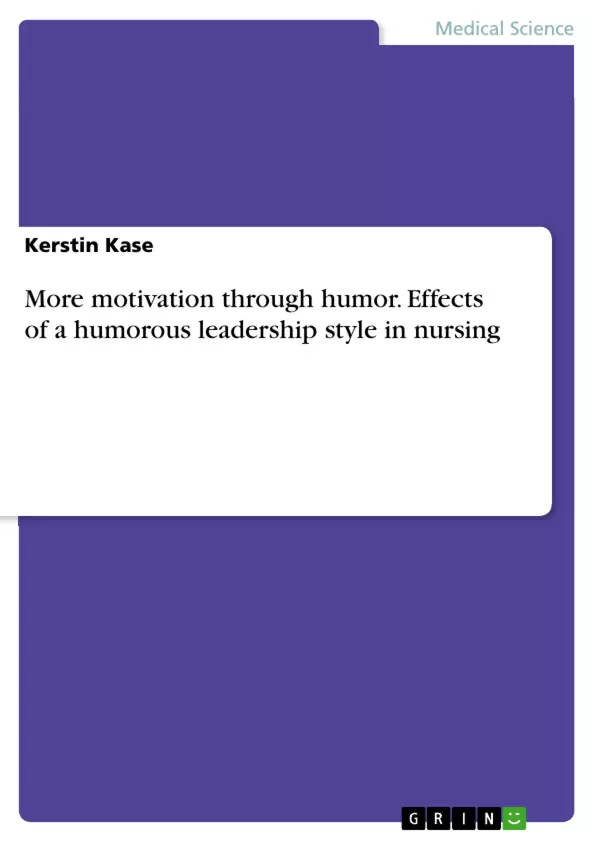The growing shortage of nursing staff is causing many employees in the nursing sector to be overwhelmed. Shift work, overtime and little free time cause excessive demands and demotivation. The consequences are a high level of sick leave, a high turnover rate and a drop in the quality of care.
It is therefore sometimes even more important in the healthcare sector than in other sectors to motivate and retain employees over the long term. As Kerstin Kase shows in her publication, managers in particular have a duty here. But which factors actually play a role?
Kase examines whether humor is a suitable means of motivating employees in the care industry and counteracting (internal) resignations. The author presents different leadership styles and considers the effects of humor on motivation in companies and teams.
From the content:
- Humor;
- Care;
- Motivation;
- Healthcare;
- Management style
Inhaltsverzeichnis (Table of Contents)
- Approach to the topic
- The situation in the care of the elderly and the sick
- Motivation
- Motivation theories
- Conscious and unconscious motivation
- Conclusion
- Motivation and emotion
- Humor and laughter
- Forms of humor
- Laughter
- Humor and salutogenesis
- Functions of humor
- Conclusion
- The role of the leader
- Leadership and motivation
- Classic leadership concepts
- Authoritarian leadership style
- Leadership style and humor
- Humor in the company
- Advantages of a humor culture
- Humor in nursing and geriatric care
- Possibilities of implementing a humor concept
- Conclusion and outlook
Zielsetzung und Themenschwerpunkte (Objectives and Key Themes)
This work examines the impact of a humorous leadership style in nursing and geriatric care, exploring the connection between motivation, emotion, and humor. The objective is to understand how a humorous approach can positively influence employee motivation, reduce stress, and improve the overall quality of care in challenging healthcare environments.
- The influence of humor on motivation and employee well-being
- The role of leadership styles in fostering positive workplace environments
- The benefits of a humorous approach in managing stress and conflict
- The application of humor in geriatric care and its potential to improve patient care
- The need for further research on the impact of humor in the healthcare setting
Zusammenfassung der Kapitel (Chapter Summaries)
- Approach to the topic: This chapter introduces the increasing demand for geriatric care and the associated challenges faced by employees, including high workloads, stress, and staff shortages. It highlights the need for effective strategies to motivate and retain employees, emphasizing the potential role of humor in this context.
- The situation in the care of the elderly and the sick: This chapter explores the current situation in geriatric care, focusing on the increasing demand for services and the challenges faced by care providers. It discusses the impact of growing pressure, limited resources, and staff shortages on the quality of care.
- Motivation: This chapter dives into the concept of motivation, outlining various motivation theories and exploring the difference between conscious and unconscious motivations. It provides a theoretical framework for understanding the driving forces behind human behavior.
- Motivation and emotion: This chapter examines the intricate relationship between motivation and emotion, exploring how emotions play a crucial role in shaping individual motivation and behavior. It sets the stage for exploring the impact of humor on both motivation and emotions.
- Humor and laughter: This chapter explores the multifaceted concept of humor, discussing different forms of humor, the psychology of laughter, and the positive effects of humor on health and well-being. It highlights the potential benefits of incorporating humor into the workplace.
- The role of the leader: This chapter examines the crucial role of leadership in creating motivating and supportive work environments. It discusses various leadership styles and their impact on employee motivation and overall team performance.
- Leadership style and humor: This chapter delves into the specific benefits of a humorous leadership style. It explores the potential of incorporating humor within companies, outlining the advantages of a humorous work culture, and highlighting the unique benefits of humor in the nursing and geriatric care context.
Schlüsselwörter (Keywords)
The key terms and concepts explored in this text include leadership styles, humor, motivation, emotion, geriatric care, nursing, employee well-being, stress management, and conflict resolution. These keywords highlight the focus on understanding the impact of a humorous approach in creating a positive and motivating work environment within the challenging context of geriatric care.
Frequently Asked Questions
Can humor improve motivation in nursing staff?
Yes, research suggests that a humorous leadership style can positively influence employee motivation, reduce stress, and help counteract internal resignations in the care industry.
What are the benefits of a "humor culture" in healthcare?
A humor culture can improve team dynamics, lower sick leave rates, enhance patient care quality, and provide a buffer against the high emotional demands of geriatric care.
How does humor affect stress management for nurses?
Humor acts as a coping mechanism (salutogenesis) that helps staff process difficult emotions, resolve conflicts more easily, and maintain psychological well-being.
What role do managers play in implementing humor at work?
Managers are key in fostering a supportive environment where humor is encouraged, moving away from authoritarian styles to more emotionally intelligent leadership.
Why is motivation so critical in the current nursing sector?
Due to staff shortages, shift work, and high workloads, effective motivation is essential to retain qualified staff and ensure the long-term stability of healthcare services.
- Citar trabajo
- Kerstin Kase (Autor), 2018, More motivation through humor. Effects of a humorous leadership style in nursing, Múnich, GRIN Verlag, https://www.grin.com/document/1223388



